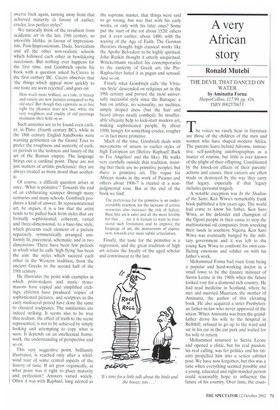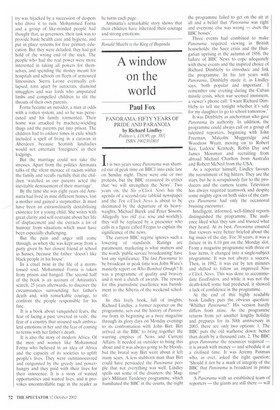A very African story
Ronald Mutebi
THE DEVIL THAT DANCED ON WATER by Aminatta Forna HatperCollins, £17.99, pp. 416, ISBN 0002570653 The voices we rarely hear in literature are those of the children of the men and women who have shaped modern Africa. The parents leave behind fulsome, instructive, self-justifying autobiographies as a matter of routine, but little is ever known of the plight of their offspring. Conditioned by the knock-on effects of their parents' actions and causes, their careers are often made or destroyed by the way they carry that legacy, especially if that legacy includes personal tragedy.
A notable exception was In the Shadow of the Saint, Ken Wiwa's remarkably frank book published a few years ago. The world had come to know his father, Ken Saro Wiwa, as the defender and champion of the Ogoni people in their cause to stop the multinational oil companies from wrecking their lands in southern Nigeria. Ken Saro Wiwa was eventually hanged by the military government and it was left to the young Ken Wiwa to confront his own conflicting emotions and soldier on with his father's work.
Mohammed Forna had risen from being a popular and hard-working doctor in a small town to be the finance minister of Sierra Leone in the 1960s when the future looked rosy for a diamond-rich country. He had read medicine in Scotland, where he met and married Maureen, the mother of Aminatta, the author of this elevating book. He also acquired a strict Presbyterian father-in-law who never approved of the union. When Aminatta was born the grandfather drove his wife to the hospital in Bellshill, refused to go up to the ward and sat in his car in the car park and waited for his wife to return.
Mohammed returned to Sierra Leone and opened a clinic, but his real passion, his real calling, was for politics and his talents propelled him into a senior cabinet post. We have now forgotten, but this was a time when everything seemed possible and a young, educated and right-minded person could reasonably hope to influence the future of his country. Over time, the coun try was hijacked by a succession of despots who drove it to ruin. Mohammed Forna and a group of like-minded people had thought that, as governors, their task was to provide basic health care and hygiene, and put in place systems for free primary education. But they were deluded, they had got hold of the wrong end of the stick. The people who had the real power were more interested in taking all powers for themselves, and spending the money meant for hospitals and schools on fleets of armoured limousines. Sierra Leone eventually collapsed, torn apart by autocrats, diamond smugglers and war lords who amputated limbs and compelled children to slit the throats of their own parents.
Forna became an outsider, a man at odds with a rotten system, and so he was persecuted and his family tormented. Their home was attacked by machete-wielding thugs and the parents put into prison. The children had to endure times in exile which included a spell of living in a caravan in Aberdeen because Scottish landladies would not entertain 'foreigners' in their lodgings.
But the marriage could not take the stresses. Apart from the politics Aminatta talks of the silent menace of racism within the family and recalls ruefully that the children 'watched as our parents acted the inevitable denouement of their marriage'.
By the time she was eight years old Aminatta had lived in nine different homes, lost a mother and gained a stepmother. It must have been an extraordinarily destabilising existence for a young child. She writes with great clarity and self-restraint about her life of displacement and she extracts a lot of humour from situations which must have been especially challenging.
But the pain and anger still come through, as when she was kept away from a party given by her closest friend at school in Sussex, because the father 'doesn't like black people in his house'.
In a cruel twist in the life of a stormtossed soul, Mohammed Forna is taken from prison and hanged. The second half of the book is an account of Aminatta's search, 25 years afterwards, to discover the circumstances surrounding her father's death and, with remarkable courage, to confront the people responsible for his fate.
It is a book about vanquished fears, the fear of facing a past 'covered in veils', the fear of a country that aroused such ambivalent emotions in her and the fear of coming to terms with her father's death.
It is also the story of modern Africa. Of the men and women like Mohammed Forna who believed in an idea of Africa and the capacity of its societies to uplift people's lives. They were outmanoeuvred and outgunned by the greedy and powerhungry and they paid with their lives for their innocence. It is a story of wasted opportunities and wasted lives, and it provokes uncontrollable rage in the reader as he turns each page.
Aminatta's remarkable story shows that their children have inherited their courage and strong emotions.
Ronald Mutebi is the King of Buganda.



































































































 Previous page
Previous page